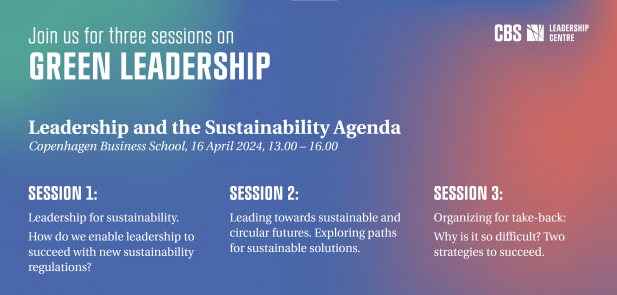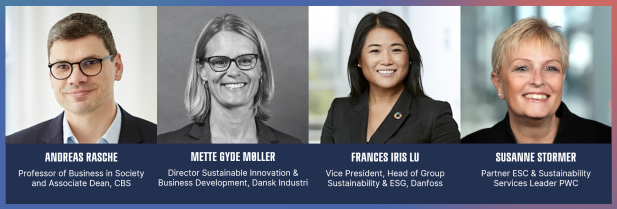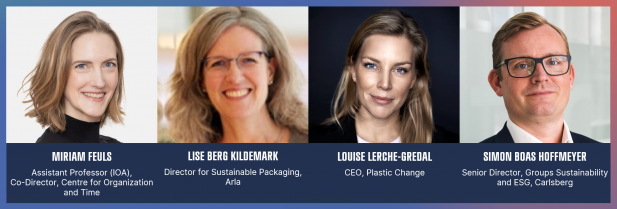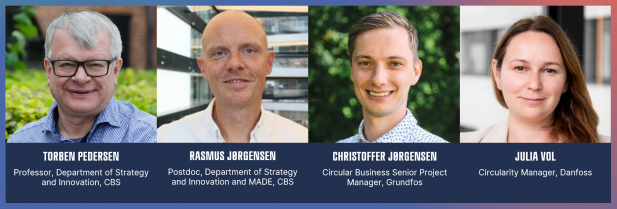Leadership and the Sustainability Agenda

Leadership is paramount to successfully navigate the challenges of green transition in organizations. Leaders shape the culture, drive commitment, and make strategic decisions that support the sustainability agenda. CBS Leadership Centre is hosting the Green Leadership track with three inspiring sessions in which business leaders and leadership researchers from Copenhagen Business School will discuss strategic and operational leadership approaches to succeed with leadership for a sustainable future.
Session 1:
Leadership for sustainability. How do we enable leadership to succeed with new sustainability regulations?
For our first session, we will discuss the responsibilities of boards in the sustainability agenda and how to approach the new European sustainability regulations. While regulations such as the Corporate Sustainability Reporting Directive (CSRD) or the Corporate Sustainability Due Diligence Directive (CSDDD) have attracted much public attention, there is usually little discussion about leadership dynamics when implementing these frameworks.
Chair: Andreas Rasche, Professor of Business in Society and Associate Dean, CBS
Beyond Compliance – How To Embed Sustainability Regulations into Organizations
With the new EU regulations (such as CSRD and the EU Taxonomy), you will get to know your organisation better, which can help you prioritise and strategize. The regulations can be powerful frameworks to tell your customers and buyers about your sustainability initiatives. And you will build expertise in a field that will be in bigger demand in the future. But, all of these benefits can only be unleased if regulatory implementation is approached from a leadership and less from a pure compliance perspective. The presentation outlines key pillars of such a ‘beyond-compliance’ view on the new EU sustainability regulations.

Session 2:
Leading towards sustainable and circular futures. Exploring paths for sustainable solutions
This session will focus on developing strategies toward sustainable and circular futures in the context of circular economy approaches to tackling plastic pollution. Despite companies committing to distant sustainability goals, such as becoming carbon net neutral by 2050, and beginning to investigate the connections between climate change, loss of biodiversity, and plastic pollution, we still need to learn more about how to attain these goals in practice.
Chair: Miriam Feuls, Assistant Professor at the Department of Organization, CBS
Research: Making Distant-Futures Actionable – How to translate distant-future goals into innovative solutions
Organizations face a significant challenge when working towards distant-future goals, as many of the solutions required for attaining these goals do not yet exist. So, how can organizations make informed decisions when the future is uncertain and the path to achieving their goals is unknown?
In this presentation, we will use tackling plastic pollution as an example and share insights on how a sustainable packaging workstream developed a sustainability strategy in response to the organization's commitment to distant sustainability goals. Based on our findings, we developed a process model explaining how the actors involved enacted multiple paths of solutions, gradually moving closer to the goals and embedding them as a sustained course of action. These insights will form the basis for discussing the challenges and opportunities of leading towards sustainable and circular futures.

Session 3:
Organizing for take-back: Why is it so difficult? Two strategies to succeed.
Our last session will include a presentation of state-of-the-art research on this topic as well as two company presentations that illustrate the challenges.
Chair: Torben Pedersen, Professor, & Rasmus Jørgensen, Postdoc, at the Department of Strategy and Innovation, CBS
Take-back systems, where the manufacturers take back the discarded products, are an operationalization of the circular economy that entails the recycling and reuse of existing materials in products and services rather than exploiting more of the Earth's scarce materials. The environmental value from product take-back arises from the substitute use of existing materials rather than virgin materials and from the waste reduction that would otherwise end up in landfills or as pollution. The financial value comes from treating the discarded products as having a value (like virgin materials) that can be extracted rather than be thrown away as just “waste”.
The potential and need for more take-back systems are there. Nevertheless, these potentials of take-back systems remain largely unrealized, as product take-back initiatives have proven difficult to implement in practice. Mainly because it requires the building of new internal capabilities as well as forming an new ecosystem where all involved needs to be aligned. In this session, we are trying to understand from a business perspective what the strategic and organizational challenges are in making take-back systems feasible and financially viable.
